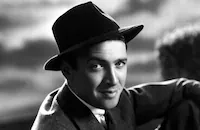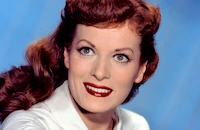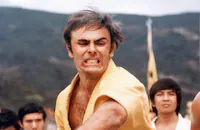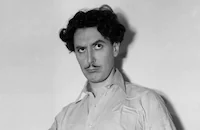Mr. Hobbs Takes a Vacation

Brief Synopsis
Cast & Crew
Henry Koster
James Stewart
Maureen O'hara
Fabian
Lauri Peters
Lili Gentle
Film Details
Technical Specs

Synopsis
Roger Hobbs is a banker whose hopes for a quiet summer vacation are dashed when his wife, Peggy, decides that what they need is a little family "togetherness" at a cottage by the seashore. From the very beginning things go wrong. Their rented cottage turns out to be such a dilapidated Gothic eyesore that their cook, Brenda, leaves in a huff; son Danny prefers television to the beach; daughter Katey also refuses to go out because of the braces on her teeth; daughter Susan arrives with her unruly children and has a spat with her unemployed husband, Stan, who promptly leaves; daughter Janie's egghead husband, Byron, becomes the all-too-willing prey of Marika, a bikini-clad siren; and Peggy is openly wooed by Reggie McHugh, a yacht club romeo. But, by steady perseverance, Mr. Hobbs manages to restore family harmony. He conquers the house's rebellious pump, wins Danny's respect and admiration by guiding a small boat through a dense fog, overcomes Katey's shyness by introducing her to a good-looking youngster named Joe, helps Stan get a job by entertaining the privately alcoholic Mr. and Mrs. Turner, steers Byron away from Marika by implying that she is hopelessly schizophrenic, and outromances the pompous Reggie. When their vacation ends, Hobbs greets with something less than enthusiasm his wife's announcement that she has leased the cottage for the following summer.

Director

Henry Koster
Cast

James Stewart

Maureen O'hara
Fabian
Lauri Peters
Lili Gentle

John Saxon

John Mcgiver

Marie Wilson

Reginald Gardiner
Valerie Varda
Natalie Trundy
Josh Peine
Michael Burns
Minerva Urecal
Richard Collier
Peter Oliphant
Tom Lowell
Stephen Mines
Dennis Whitcomb
Michael Sean
Crew
L. B. Abbott
Malcolm Brown
Alfred Bruzlin
Warren B. Delaplain
Don Feld
Marjorie Fowler
Marvin A. Gluck
Jack Hayes
Nunnally Johnson
Henry Mancini
Henry Mancini
William C. Mellor
Johnny Mercer
Ben Nye
Stuart A. Reiss
Joseph E. Rickards
Walter M. Scott
Leo Shuken
Jack Martin Smith
Helen Turpin
Jerry Wald
William Witney

Film Details
Technical Specs

Articles
Mr. Hobbs Takes a Vacation
Henry Koster's 1962 Mr. Hobbs Takes a Vacation isn't exactly an earth-shattering satire of early '60s family life. But the picture -- starring James Stewart as the Mr. Hobbs of the title, a St. Louis banker who gets less, and yet more, than he bargained for when he spends a month's holiday with his family on the northern California coast - is still surprising in some ways, employing some comedic shorthand that's surreptitiously less than squeaky-clean.
For one thing, it's strongly suggested - and not so much with words - that Mr. Hobbs and his comely wife, Peggy (Maureen O'Hara), still have a healthy sex life. And this is after a marriage that has produced four children, two of whom have already married and borne children of their own. Perhaps even more remarkably - or maybe it only seems so, in this age of parenting when children often rule the roost - that Hobbs and Peggy form a united front when it comes to dealing with their kids. They love them all, dearly, but when one of the grandkids behaves like a spoiled brat, Hobbs draws himself up to his full height and says so out loud. At night, he and his wife huddle in bed, discussing the events of the day; Peggy might defend the kids occasionally, but for the most part, she and Hobbs are on the same page. You wouldn't call their parenting style tough love, but they know a rude or sullen kid when they see one. (It's also interesting to note that the movie makes reference - twice - to Hobbs' buying Playboy for the couple's son, whose age isn't specified but who appears to be around 12. That's something you wouldn't get in a contemporary comedy.)
Mr. Hobbs Takes a Vacation was the first of three family comedies Koster directed in the early to mid 1960s, all of them featuring Stewart. (Take Her, She's Mine, with Sandra Dee, and Dear Brigitte followed in 1963 and 1965, respectively. Koster had also directed Stewart years earlier, in the 1950 Harvey.) Stewart was in his mid-fifties at the time he made these films, and if they don't stand among his best, and best-recognized, work, they at least show an actor who's fully at home in his own skin when doing comedy. New York Times critic Vincent Canby considered Stewart a "behavioral" actor - unlike, say, Sir Laurence Olivier or Daniel Day-Lewis, who "create characters that are immediately identifiable as being physically and emotionally separate from themselves." Instead, Stewart, as a behavioral actor, "somehow absorbs each role into his own particular physical frame, shaping the mannerisms, the voice and even the intelligence to coincide with those of the known actor. This he does with such simplicity and ease that, for many years, the initial response was to say that what he does isn't acting, followed up by the damp, desperate criticism that he is always the same."
That's as true in Mr. Hobbs Takes a Vacation as it is in any of Stewart's films. In one scene, he's forced to jump-start the antiquated boiler in the ramshackle house he and the family have rented. He gingerly approaches the thing (which appears to be modeled on a Rube Goldberg contraption), cranks it up and deftly steps back, waiting for an explosion, or worse. Stewart treats this cartoonish assemblage of pipes, cylinders, nuts and bolts as if it were an unpredictable dance partner; his caution and mistrust are expressed in a kind of offhanded fox-trot, a perfect example of Stewart's jackknife agility. Later, he tries to impress the potential employer of his out-of-work son-in-law - the would-be boss man is played by a hilarious John McGiver - with his bird watching skills; the sequence is delightfully silly, if only because Stewart somewhat resembles a gangly bird himself. (Stewart's performance in the picture netted him a Silver Bear Award for best actor at the 12th Berlin Film Festival.)
The script here is by veteran screenwriter Nunnally Johnson, adapted from a novel by Edward Streeter, and it includes the expected scenes of family disagreement and bonding: Mr. Hobbs and son Danny (Michael Burns), who haven't been getting along terribly well, go out for a day of sailing and get lost in a fog, subsequently drawing closer. In one of the movie's most charming sequences, Hobbs and Peggy bring their shy 14-year-old daughter Katey (played by Lauri Peters, who had originated the role of Liesl Von Trapp in the stage version of The Sound of Music) to a local dance. Katey has just gotten braces and is feeling self-conscious; she sits on the sidelines as the other kids hit the dance floor. Anxious about her, Hobbs singles out one of the boys and hands him a five-dollar bill to dance with her. The scenario might have ended disastrously, but its resolution is sweet - and it doesn't hurt that the boy Hobbs chooses for Katey is played by teenage heartthrob Fabian. Later, he and Katey, while hanging out with the other kids at the local pizza joint, perform the movie's only musical number, a ridiculous little ditty called "Cream Puff." But even with all its goofiness, it still works as a cartoon riff on teenage love.
Producer: Marvin A. Gluck, Jerry Wald
Director: Henry Koster
Screenplay: Nunnally Johnson (screenplay), Edward Streeter (novel)
Cinematography: William C. Mellor
Music: Henry Mancini
Film Editing: Marjorie Fowler
Cast: James Stewart (Mr. Hobbs), Maureen O'Hara (Peggy), Fabian (Joe), Lauri Peters (Katey), Lili Gentle (Janie), John Saxon (Byron), John McGiver (Mr. Turner), Marie Wilson (Mrs. Turner).
C-116m.
By Stephanie Zacharek
SOURCES:
IMDb
The New York Times

Mr. Hobbs Takes a Vacation
Quotes
Trivia
trumpet player at the yacht club.
Miscellaneous Notes
Winner of the Best Actor Prize (Stewart) at the 1962 Berlin Film Festival.
Released in United States 1962
Released in United States on Video May 1988
Shown at the 1962 Berlin Film Festival.
CinemaScope
Released in United States 1962
Released in United States 1962 (Shown at the 1962 Berlin Film Festival.)
Released in United States on Video May 1988














